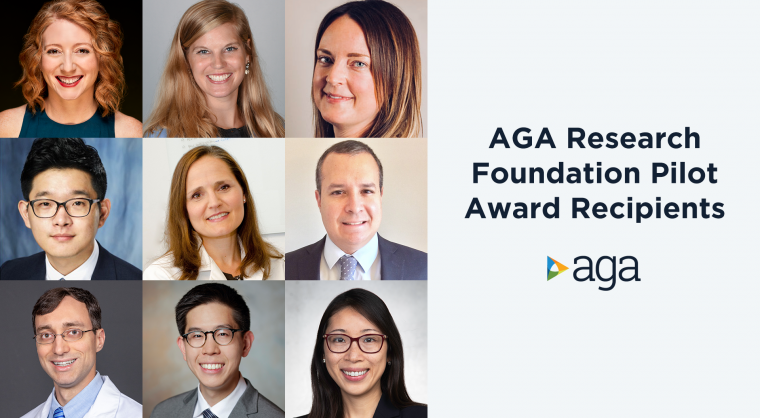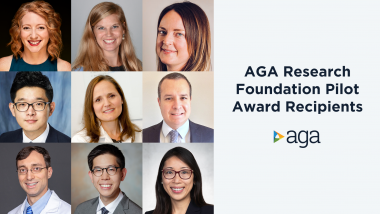The AGA Research Foundation was proud to award nine distinguished investigators with AGA pilot research awards in the 2022 awards cycle.

Dennis Shung, MD, MHS
Yale School of Medicine
Project: Automatic identification of polyps using self-supervised contrastive learning on colonoscopic images
Dr. Shung’s observation of labor-intensive labelling processes led to a proposed unsupervised method that does not require labels to segment endoscopic images. His method performs clustering to identify areas that are sufficiently different from one another in the image, such as a polypoid area. Then the clusters are mapped back to the original image for verification with the ground truth labels by two gastroenterologists. The embeddings are then mapped across different image datasets to identify areas of interest and generate embeddings that are generalized across multiple endoscopic systems. Dr. Shung intends to continue as an interdisciplinary leader who creates a space for new tool development, testing and validation. He hopes to provide patients with robust algorithmic enhancement to their endoscopic procedures and minimize the harm of these algorithms from missing or mis-classifying abnormalities.
Funding for this award is provided by Medtronic.
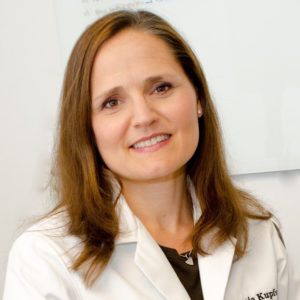
Sonia Kupfer, MD
The University of Chicago
Project: Bile acid metabolism and responses in African- and European-Americans
Dr. Kupfer aims to understand how environmental factors (e.g., diet, medications) impact colorectal cancer (CRC) risk and identify individuals who are at highest cancer risk. The pilot project will leverage cutting-edge technologies to investigate three mechanisms related to bile acid composition, metabolism, and colonic response among a diverse patient population. She wants her research to help identify patients across the United States who are at highest risk for colorectal cancer and enable individualized strategies to reduce this risk.
Funding for this award is provided by Merck.

Chung Sang Tse, MD
University of California, San Diego
Project: Characterizing the phenotype of functional diarrhea in ulcerative colitis by clinical, endoscopic, and histologic criteria and examining the role of social determinants of health
Dr. Tse explores the associations between economic stability, education, social/ community context, health care access, and neighborhood environments with persistent functional gastrointestinal symptoms in individuals with ulcerative colitis. The findings from this study will guide future diagnostic algorithms and interventional studies. Her long-term goal is to reduce the overall disease burden for patients with inflammatory bowel disease by addressing both inflammatory and non-inflammatory sources of morbidity as the standard of care.
Funding for this award is provided by Bristol Myers Squibb.
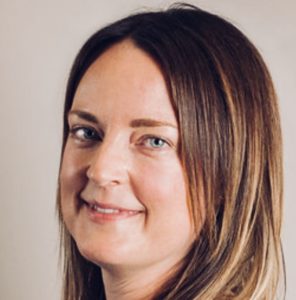
Jennifer Flemming, MD, MAS
Queen's University
Project: Examining the association between social determinants of health and immigration status with evaluation for and receipt of liver transplantation: a population-based study
Dr. Flemming seeks to improve the lives of patients living with liver disease through understanding the natural history, epidemiology and outcomes, especially in previously underrepresented and understudied populations such as immigrants and refugees. Her research will provide fundamental knowledge on how social determinants of health and immigration status impact access to liver transplantation once health care insurance is not an obstacle. Her goal is to help mitigate disparity in accessing liver transplantation so that all patients with cirrhosis have an equal opportunity to improve their health and long-term survival.
Funding for this award is provided by Janssen Biotech, Inc.

Young-Rock Hong, PhD, MPH
University of Florida
Project: Novel social determinants of health assessment tool for early-onset colorectal cancer burden
Dr. Hong focuses on social determinants of health as contributing factors to increasing early-onset colorectal cancer (CRC). To assess CRC mortality outcomes, his research team developed a risk score integrating the multivariate effects of social determinants of health. Using this validated approach, the purpose of this research is to understand how access to grocery stores, density of fast-food restaurants, and food insecurity are related to early-onset CRC at the county-level within the United States. The resulting risk drivers will inform the creation of a risk assessment tool for local health departments and health care systems to identify communities at risk and devise targeted interventions.
Funding for this award is provided by AGA Research Foundation 2020 AGA Giving Day Campaign donors.

Zachary Reichenbach, MD, PhD
Lewis Katz School of Medicine, Temple University
Project: Investigating the cellular and molecular factors contributing to health disparities in esophageal cancer
Dr. Reichenbach relies on single cell RNA-sequencing to examine race-based differences at the level of single cell resolution in esophageal mucosa. His study of African American and Caucasian patients focuses on identification of cell types and pathways displaying differential expression and informs our understanding of the pathophysiological mechanisms contributing to esophageal cancer. He would like his research to influence novel strategies for improving diagnosis, monitoring and therapy in esophageal cancer patients.
Funding for this award is provided by Amgen.

Karen Edelblum, PhD
Rutgers New Jersey Medical School
Project: Microbiota-driven changes to IEL and Paneth cell compartment in ileitis
Dr. Edelblum studies immune–epithelial interactions to better understand the underlying causes of Crohn’s disease. It’s unknown whether amplification of the immune system’s own antimicrobial responses can prevent potential disease-initiating events. She aims to find a way to boost the gut’s natural immune defenses and thus prevent a triggering event at the epithelial barrier that could initiate disease relapse. Her goal is to identify processes or pathways to strengthen and maintain remission without suppressing the immune system.
Funding for this award is provided by Pfizer, Inc.

Melinda Engevik, PhD, MS
Medical University of South Carolina
Project: Dissecting the contributions of gut microbes to Fusobacterium outer membrane vesicles production
Dr. Engevik specializes in intestinal epithelial-microbe interactions and aims to identify the role of emerging microbes in inflammatory bowel disease (IBD). She studies both pathogens and commensal bacteria to determine how microbes can harm or help the host. Ultimately, these investigations will open pathways for developing and improving lower-risk and non-invasive therapeutics. Her intent is to deliver new therapeutic targets for IBD patients.
Funding for this award is provided by Pfizer, Inc.
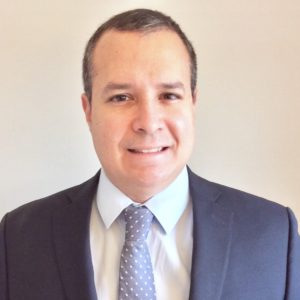
Andre Paes Batista da Silva, PhD, MS, DDS
Case Western Reserve University
Project: Extra-intestinal vs. extra-oral manifestation: the gut-mouth axis in IBD mouse models
Dr. Paes treats periodontal diseases and investigates the association among oral microbiota, inflammatory bowel disease and colorectal cancer. He’s dedicated to improving risk assessment for patients with IBD and CRC, both on their diagnosis and diseases progression. His goal is to identify the precise mechanism(s) of the oral-gut axis in pathogenesis of periodontal diseases, inflammatory bowel disease and colorectal cancer to advance methods for diagnosis, prognosis and treatment.
Funding for this award is provided by Pfizer, Inc.
This year, the AGA Research Foundation awarded more than $2.5 million in research funding to 61 investigators. See the full list of awardees.
Interested in supporting an AGA research award? Contact the AGA Research Foundation staff to learn more about how you can contribute.










